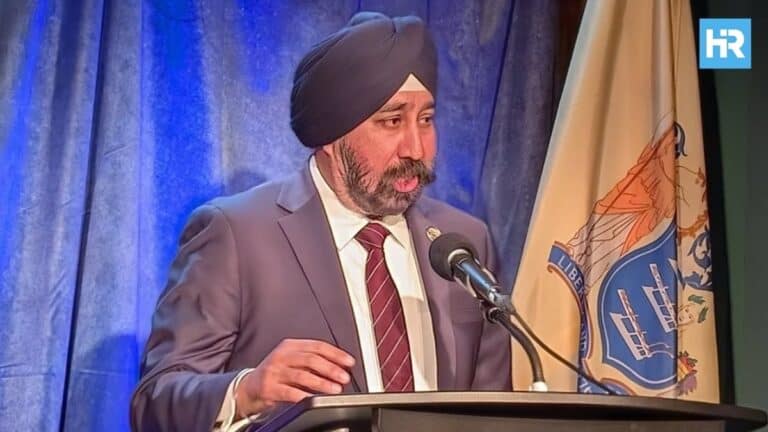
Hoboken Mayor Ravi S. Bhalla has joined 62 local governments and elected officials in urging the U.S. Supreme Court to protect the rights of Medicaid patients. The officials submitted an amicus brief in the case Medina v. Planned Parenthood South Atlantic.
This brief supports Medicaid patients’ legal right to choose their healthcare providers under the federal free-choice-of-provider provision in the Medicaid Act. The case could decide if states can block providers like Planned Parenthood from offering care to Medicaid patients.
Mayor Bhalla said that taking away the choice of providers affects reproductive health and puts the overall healthcare system at risk. He explained that restricting access for ideological reasons places unnecessary stress on already full local hospitals and clinics.
- Hoboken Mayor Ravi Bhalla joined 62 local officials in urging the U.S. Supreme Court to uphold Medicaid patients’ right to choose their healthcare providers.
- The case Medina v. Planned Parenthood could change how millions of low-income Americans access reproductive and essential health services.
- New York Attorney General Letitia James and 16 other attorneys general argue that states must not block qualified providers like Planned Parenthood from Medicaid networks.
Hoboken’s Medicaid Dependence Shows Urgency
Medicaid is the largest public funder of family planning in the U.S. It covers more than 16 million women of reproductive age. The brief argues that if this right is removed, patients will lose access to essential services.
These include reproductive care, birth control, STI testing, cancer screenings, and other routine treatments. The burden would shift to government-run clinics, which are already under pressure.
In Hoboken, the issue is direct and current. Over the past year, the city’s social workers helped more than 65 people apply for or renew their Medicaid coverage.
Many of these residents rely on consistent access to care. Bhalla’s involvement confirms Hoboken’s commitment to protecting health access for all residents, regardless of income.
South Carolina Case Reaches Supreme Court
The case started in South Carolina in 2018. That year, the state removed all abortion clinics and related doctors from its list of Medicaid providers. A Medicaid patient challenged this removal in court. A federal district court ruled the state’s action was illegal.
In March 2024, the Fourth Circuit Court of Appeals upheld the ruling. Now, the U.S. Supreme Court is reviewing the case.
The brief signed by Mayor Bhalla explains that enforcing the free-choice-of-provider rule is necessary. If the Court decides in favor of South Carolina, many patients across the country could lose access to qualified care providers.
Attorney General Letitia James Leads State Response
New York Attorney General Letitia James also submitted a legal brief, joined by attorneys general from 16 other states and the District of Columbia. Together, they argue that Medicaid must protect the patient’s right to choose any qualified provider.
Attorney General James stated that Medicaid’s purpose is to allow vulnerable populations to access safe and affordable care. She emphasized that removing providers from Medicaid limits this access and goes against the program’s foundation.
The coalition also made clear that Planned Parenthood provides essential care beyond abortion. In 2023, Planned Parenthood of Greater New York performed over 175,000 STI tests, more than 18,000 cancer screenings, and over 10,000 insertions of long-acting contraception. Medicaid covers these services, which are critical to public health.
The attorney general explained that although states can manage Medicaid programs, they must follow federal protections. The free-choice-of-provider provision ensures that the state cannot restrict patient access for political or ideological reasons.
Planned Parenthood Responds to Political Interference
Paige Johnson, interim CEO and president of Planned Parenthood South Atlantic, responded directly. She said the situation shows that politics is affecting healthcare. According to Johnson, anti-abortion politicians are using Medicaid rules to attack providers like Planned Parenthood.
She pointed out that patients depend on Planned Parenthood for basic care such as birth control, STI testing, and cancer screenings. Blocking these services harms low-income patients the most. Johnson added that everyone should have the right to receive care from trusted doctors, no matter their income or insurance status.
Ongoing Legal Action to Defend Reproductive Healthcare
This Supreme Court case is one of several legal actions involving Attorney General Letitia James. She has consistently defended reproductive healthcare access both in New York and nationally.
In October 2024, James filed briefs to protect access to emergency abortion care and mifepristone, a medication used in abortion. In May 2024, she sued an anti-abortion group and 11 crisis pregnancy centers for promoting false “abortion reversal” methods.
In April 2024, she led efforts asking Congress to expand reproductive healthcare rights through the Access to Family Building Act.
In January 2024, she led 24 attorneys general in a brief urging the Supreme Court to protect mifepristone access. In December 2022, she secured a court order stopping the anti-abortion group Red Rose Rescue from blocking abortion clinic access in New York.
California, Colorado, Delaware, Hawai’i, Maryland, Massachusetts, Michigan, Minnesota, Nevada, New Jersey, New Mexico, North Carolina, Oregon, Rhode Island, Washington, and the District of Columbia are among the states joining James in this latest action.









